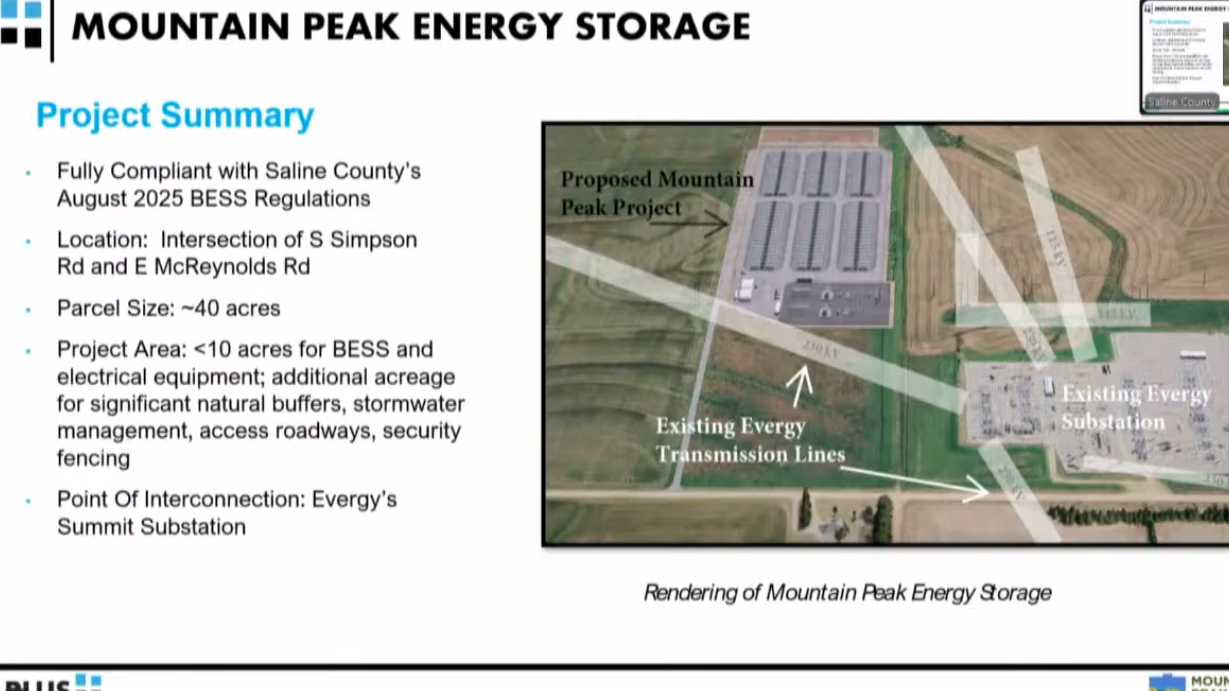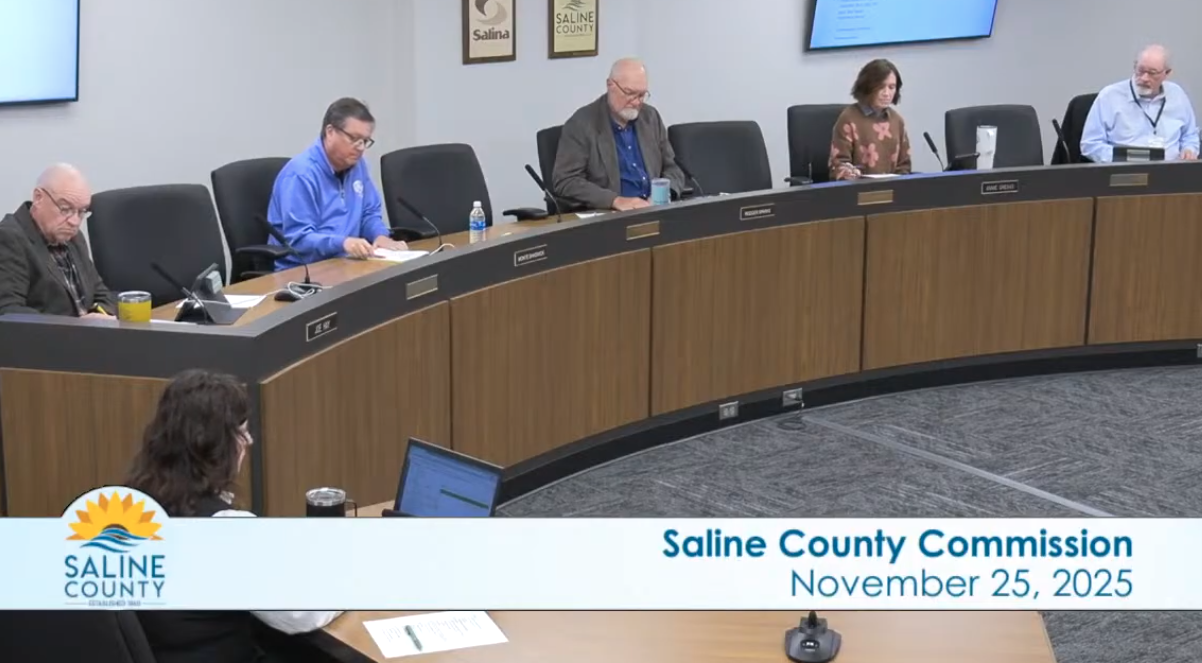Planning Commission Approves Conditional Permit For Battery Storage Facility Despite Public Concerns

The Saline County Planning Commission voted Tuesday night to approve a conditional use permit for Plus Power's proposed battery energy storage facility near the Summit electrical substation, forwarding the controversial project to the County Commission for approval.
The vote came after more than two hours of public testimony in which residents raised concerns about fire safety, emergency preparedness, property values, and the lack of community consent for the industrial facility in an agricultural area.
Vote and Conditions
The commission approved CUP 2509 with multiple conditions, including a requirement that the applicant negotiate insurance coverage based on industry standards with the Planning Commission before construction begins.
An approval from the County Commission would grant Plus Power a 25-year permit that will begin when operations commence, rather than at the time of approval.
Construction would not start until 2029, with operations beginning in 2030.
The planning commission struck down one staff recommendation that would have required the applicant to reapply for a new permit if land use in the surrounding area changed during the five-year pre-construction period.
Commission members called that condition "not fair to any applicant" and said they didn't want to set that precedent.
Public Has 14 Days to Appeal
The public has 14 days from Monday's vote to file a protest petition with the county planning office.
If 20% of property owners in the notified area sign the petition, the County Commission would need a supermajority vote to approve the project.
Without a protest petition, a simple majority of County Commissioners could approve it.
Residents Cite Safety Concerns
Multiple residents questioned whether local fire departments are adequately prepared to handle potential lithium-ion battery fires. Johnny Keller of Salina noted that a single Tesla car fire requires approximately 20,000 gallons of water to extinguish, raising concerns about water main capacity in the rural area.
Teresa Swisher, who lives at 4853 East McReynolds Road, questioned the comprehensiveness of noise testing. "Will the noise test be completed in all stages of running? Will it be tested at nighttime? Will it be tested during peak times? Or is this just going to be a one time go out in the middle of the afternoon?" she asked.
A resident, who was also reportedly a former HAZMAT certifier, expressed concern about toxic smoke from potential fires, noting that prevailing winds would carry smoke toward a school within two miles of the site. (This issue was reportedly addressed in documents available on the Planning Department website).
Setback Distances Remain Contentious
Carolyn Sichley of East McReynolds Road criticized the commission for rejecting community requests for increased setback distances from residential properties.
"The community's requested setbacks were rejected and what was not discussed and what continues to be overlooked is how reduced setbacks directly impact our homes, our safety, the community aesthetics, and our property values," Sichley said. "Our concerns were dismissed due to the financial feasibility for the developer, not for the safety and quality of life for the people living next to it."
She cited Harvey County's recent moratorium on battery energy storage systems as evidence that other Kansas communities are taking a more cautious approach.
She also referenced California's new Senate Bill 283, enacted after the Moss Landing fire, which strengthens environmental review for energy storage facilities.
Sichley urged the commission to "deny or delay this application until comprehensive independently verified safety precautions and setbacks are in place."
Plus Power's Case
Christina Hoffman from Plus Power told commissioners the company is American-owned and operated, founded in 2018, and exclusively focuses on standalone battery energy storage. The company currently operates eight projects nationwide with a ninth nearing completion in Maine.
The facility would occupy less than 10 acres of a 40-acre parcel on Simpson Road near McReynolds Road. It would be set back approximately 1,000 feet from the road with a low profile design, less visible than the existing Evergy substation.
The project would store electricity during off-peak hours and discharge it during peak demand, helping stabilize the regional power grid and reduce electricity costs for all ratepayers.
Hunter Armstrong, Senior Project Development Manager for Plus Power, said the company is prepared to offer more than $18 million in financial benefits to the county over the project's 20-year operational life.
The company would also create a handful of local jobs - three to five full-time positions for facility operation and maintenance.
Emergency Response Plans
Emergency management officials and rural fire personnel attended the meeting. Fire officials confirmed the facility would include two 24,000-gallon water tanks, one at each gate, along with fire district tankers for emergency response.
Officials noted that battery management systems would detect thermal issues early, and modern lithium iron phosphate (LFP) batteries produce smoke comparable to house fires, with test data from California showing emissions within federal guidelines.
Project Details
The Mountain Peak Energy Storage project would nestle around existing electrical infrastructure at the Summit substation, one of the largest and most complex substations in Kansas and the Southwest Power Pool.
The facility would require grading of approximately 15 acres within the site area to create flat, stable surfaces for the battery containers.
All topsoil would be stockpiled on-site for re-vegetation.
Plus Power requested modifications to standard regulations given the extended development timeline typical for energy infrastructure projects. The commission approved most of these requests.
Third-party compliance reviews would be conducted at the applicant's expense every five years following project approval.
The application represents the first battery storage facility reviewed under new county regulations adopted specifically to address such proposals.
The 1,065-page conditional use permit application was described by one resident as containing extensive technical information.
Next Steps
The County Commission will make the final decision on the conditional use permit. The Planning Commission's approval serves as a recommendation.
If no protest petition is filed within 14 days, the County Commission could approve the project with a simple majority vote.
A protest petition signed by 20% of notified property owners would trigger a supermajority requirement.
Construction would not begin until 2029 at the earliest, with operations starting in 2030.
The applicant must provide annual status updates to county staff until construction begins.
Receive Local Information Like This In Your Inbox
Stay informed with stories and updates from your community


